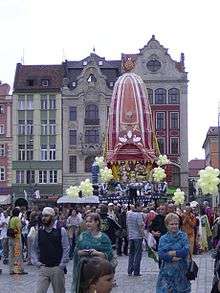Indians in Poland
| Total population | |
|---|---|
| (4,000 (2014)) | |
| Regions with significant populations | |
| Warsaw · Łódź · Pabianice | |
| Languages | |
| Polish · various languages of India · English | |
| Religion | |
| Hinduism · Sikhism | |
| Related ethnic groups | |
| People of Indian Origin |
The Indian community in Poland consist of migrants from India to Poland and their locally born descendants. There are approximately 4,000 Indians in Poland.[1]
Migration history
Indians started migrating to Poland in the late 80’s and early 90’s when the political situation changed and new opportunities started to emerge.[2] Most of them are businessmen who migrated to cash on the economic boom after Warsaw opted for a free-market economy in 1989 and joined the European Union in 2004. In 2007, Poland signed an agreement with India to admit more Indian migrant workers, as part of an effort to ameliorate labour shortages caused by the outward migration of hundreds of thousands of Polish workers to richer countries in the European Union.[3] New important group of Indians in Poland are students and academics.[4] Recent research shows that the Indian community is quite well integrated in the Polish society.[5]
Culture
The Indian community in Poland is a business minded and law-abiding community. They have their own 'Little India' in Warsaw as a large number of the community are based there while there others based in Łódź and Pabianice. There are 22 Indian restaurants in Warsaw while there 20 more throughout Poland.
The Indian community in Poland enjoys a good reputation. Indians are considered hard studying, non-political and peaceful.[6]
The Indian Association of Poland is one organization which brings Indians and Polish people together by organizing various cultural events in Poland. Every month it organizes Bollywood Nights in Warsaw and other cities.
Religion

Hindus and Sikhs form the majority of the Indian community. Hinduism has spread to Poland through ISKCON missionaries since 1976. The first Polish Hindu temple was established in 1980 in Czarnów, Lower Silesian Voivodeship (New Shantipur Temple in Czarnów).[7] A new Hindu Temple named the Hindu Bhavan was constructed in Warsaw.[8] The Indian community hopes that the temple sensitizes the community's youth towards Indian tradition and customs as well as to use the new place of worship as a tool to integrate with Polish society.
There are about 12 Sikh families in Warsaw.[9] The city's Sikh Gurdwara the only Sikh shrine in the whole of Eastern Europe and it is the place where both Sikhs and Sindhis come together to celebrate Baisakhi.
See also
References
- ↑ Pędziwiatr, K., Kugiel, P. (2014) The Indian Diaspora and Poland–India Relations. PISM Report p.5
- ↑ Kontynent-Warszawa- On Indian community in Warsaw
- ↑ Poland: The Next Hot Destination for Indians
- ↑ Pędziwiatr, K., Kugiel, P. (2015) Poland as a Study Destination: The Case of Indians at Polish Universities, In: Surdej, A., Kędzierski, M., (ed.) Economic Challenges for Higher Education in Central and Eastern Europe, Wydawnictwo Adam Marszałek, Toruń, 187-213
- ↑ Pędziwiatr, K., Kugiel, P. (2014) The Indian Diaspora and Poland–India Relations. PISM Report
- ↑ Study in Poland
- ↑ Polish ISKCON history (in Polish), accessed 2010.8.4
- ↑ Pakistan Hindu Post - Poland to get a Hindu temple by August
- ↑ Thaindian News - Indian community celebrates Baisakhi in Poland